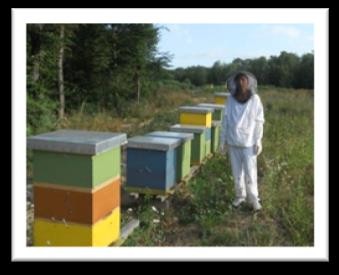
Until recently, supporting herself with her own income was not even a possibility for Zorica Mekic, a 38-year-old mother of three who lives in Sekovici, one of the poorest municipalities in Bosnia and Herzegovina (BiH). Mekic managed to finish primary school but had not even learned to drive when the Bosnian war broke out in spring 1992. In the midst of violence and chaos that lasted four years, she fell in love, got married and bore her first child.
But it is only now, more than 20 years later, that Mekic has her first job outside the home, mostly thanks to a USAID-funded project called Women’s Empowerment Through Farming. The project is helping women in the Sekovici area earn money for the first time by engaging them in the production of medicinal herbs, fruits and vegetables, and honey.
In 2009, USAID’s implementing partner, local NGO Mozaik Foundation, was given free use of former military barracks for 20 years by Sekovici municipality. The project transformed the base into a compound with farming, beekeeping facilities and the largest modern greenhouse in the Balkans.
Through this project, which closed in October 2013, Mekic learned about agriculture and beekeeping from professionals in the field, and she learned it well. She is now fully employed at the facility as an assistant beekeeper. For the first time in her life, she has a bank account and is contributing to the family budget with her husband.
“USAID’s Women’s Empowerment Project caused positive changes in all segments of my life, not just in a financial sense,” said Mekic. “It also had a positive impact on me as an individual—as a woman, wife, mother and member of the community I live in.”
More than 100 women from the Sekovici area now work year-round thanks to USAID assistance. The newfound cooperation between the project and the local municipality brings new hope to unemployed women in Sekovici and the surrounding area, observed Mekic.
“Before this project, none of this was possible for me or other BiH women like me,” she said. She’s also grateful for the chance to form new friendships with women from different ethnic groups in the area, adding, "Now Bosnian Serb and Bosniac women have a place where they come together to work and live in peace, share meals and stories, and help each other every day.”
With the project’s support, Mekic is also finishing secondary school—and she’s finally learning to drive.







Comment
Make a general inquiry or suggest an improvement.